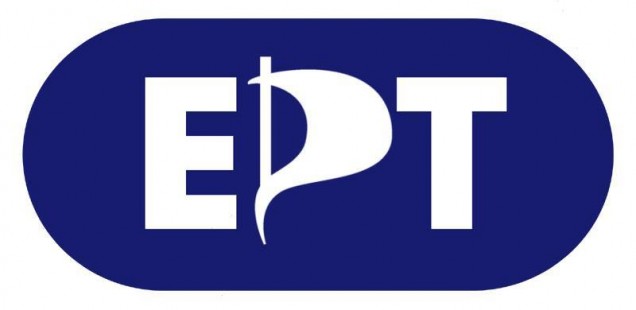GREEK PUBLIC RADIO & TV PIRATE BROADCASTS | PirateTimes

GREEK PUBLIC RADIO & TV PIRATE BROADCASTS
The sudden shut-down of ERT, the public radio and television in Greece and a founding member of EBU (European Broadcasting Union), by the Greek government with black screens appearing on TV sets on all its frequencies, caused outrage amongst journalists and caused a public outcry inside and outside the country.
ERT, the only channel in Greece licensed to operate legally, ended up broadcasting in a pirate fashion being hosted through a network of sites, including EBU, the programs being presented by former employees, journalists and technicians who occupied the central building in Mesogeion Str. The Pirate Party of Greece has been mobilized since the first moment of the announcement of ERT’s shutdown.
Following an urgent decision by the Board of PPGR, the program of ERT is being transmitted from party’s main page, with an image that became the main attraction, a mock-up of the logo of ERT that is quite descriptive of the overall situation in the country; public radio-television broadcasting in a pirated way via an internet network of supporters, such as media, associations, even the EBU and individual pages!
The parody of the ERT logo (EPT in Greek), is where the letter “P” has been replaced by a Pirate flag, was adapted by a PPGR member with the nickname “mankasp”.
The Pirate Times contacted Thanasis Gounaris, chairman of the Board of PPGR who recalled, as EBU did in its letter to the Prime Minister of Greece, that according to the Treaty of Amsterdam the system of public broadcasting in the Member States is directly related to the democratic, social and cultural needs of each society and to the need to preserve media pluralism, and explained the extraordinary decision of the Board:
“We give political cover and protection to ERT and react to any attempt to silencing free speech. Frequencies of ERT belong to Greek citizens and not to the government nor the illegal mega-contractor owners of the private sector channels. Greek peoples’ opinion has never being asked about anything, not for our entry into Euro currency, nor for the 2004 Olympics, nor the “memoranda of understanding”. There an endless list of decisions made for us but without us. Representative democracy has been dead for some time, only Pirates have the solution to this current “no way out”. Digital direct participatory democracy now!”
On Sunday 16 June 2013 Gounaris and George Misoulis, responsible person for the finance of PPGR, appeared in ERT and explained what Pirates think about the issue.
Greek Pirates want to ensure (among others)
- above all that there is a public, rather than the state, character in the new ERT
- fully transparent operation both financially and administratively
- meritocratic structure to the maximum extent with objective and publicly accessible evaluation of all employees and managers
- the exclusion of political parties’ influence at all levels of structure and function
- democratic representation of all tendencies – political and social, pluralism and openness in the transmission of ERT
- open standards software use in all systems of new ERT at maximum extent
- converting ERT’s archive to a public access library (Public domain)
- immediate abolition of this regime’s of unrestrained use and unclear licensing of spectrum and other broadcast frequencies and communication and replacing it with a clear, open and democratic framework yielding of these respective licenses.
Greek Pirates are willing to help the employees if they were asked to do so and worried what will happen to ERT’s valuable archive because of its dissolution; archive must go to the public.
Also they are afraid that the government’s heavy handed decision on ERT, will spread by the same anti-democratic manner to all issues and this is a blow to democracy.
It must be noted that ERT’s shutdown was made without the consent of the other two parties supporting Samaras government and didn’t come to a vote in the Parliament but was an administrative act, that gave management of ERT to the Ministry of Finance! The two other parties have so far disagreed with the closure of ERT and want definitely an open public television during the transition to its new form.
How unprepared was Greek government’s plan was, can been seen from the fact that the replacement for ERT will be called NERIT but none of its initiators took any steps to register the domain name for the new entity. A reporter of a newspaper registered nerit.gr and transmitted from this page the signal of pirated ERT!
Government’s main justification for this move, as a government spokesperson said, ERT was a “haven of waste” and cost more while having fewer viewers than private stations.
The truth is that with the connivance of the political system private television stations have operated for 25 years while not licensed, reaping big profits illegally. Truly one wonders who the real pirates are in this case!
Public television is the heart of democracy, even if it has low viewership, the State had to keep it in operation and promote culture. Nobody agrees with this sudden shutdown that reminiscent Eastern countries in other decades.
Treaty of Amsterdam defines that “Public service broadcasting, although having a clear economic relevance, is not comparable to a public service in any other economic sector. There is no other service that at the same time has access to such a wide sector of the population, provides it with so much information and content, and by doing so conveys and influences both individual and public opinion”.
Many people, from the first moment of the notice of closure, were overwhelmed and gathered at the headquarters of ERT to stand by the journalists and staff.
The action became apparent when black colour gradually replaced the frequencies used by ERT on televisons, a spectacle that united all; political parties and institutions and ordinary people.
The ERT network, which consists of several regional stations, was silenced and locked down with signal and power interruption and in some cases with the assistance of the special forces of the Greek police causing an authoritarian impression.
There are many objections and disagreements from many sides about ERT’s previous management that was used by the individual governments to serve selfish ends and to recruit “our children”, while lack of transparency, meritocracy and promoting the positions of government and corruption were rampant within ERT.
The whole issue is directly linked to the crisis in Greece. According to the memorandum, signed by the Greek government with the Troika, 2000 civil servants should be fired during June. With the closure of ERT more than 2500 are on the way out.
On Monday, 17 June 2013, heads of the three political parties, that support government, met to defuse the issue. Samaras insists on maintaining his positions, while the clouds of early elections are gathered dangerously above the political scene.
Media adore early elections scenarios but it seems that something has happened and it is no coincidence this time, it is just before the elections in Germany in September.
NEWS FROM PIRATES IN EDUCATION
Thanassis Gounaris, is the first ever Pirate unionist elected to the Board of Representatives of Greek Teachers Federation (D.O.E.) by the ballot “Pirates in Education.” In their first statement, “Pirates in Education” said that Gounaris will be a candidate for the 7-member Board of D.O.E. which will be elected by the General Assembly of the Representatives and will be held from 22 to 25 of June in Athens and expected about 400 teachers to take part in the voting. “Pirates in Education” announced that they will broadcast the G.A. live via internet for the first time in the history of the body, giving the opportunity to every Greek teacher, no matter how remote they are, to hear what happens inside the hall.
UPDATE: At the time of publication it appears that ERT is back on air due to a court order.
Featured Image: CC BY-SA by mankasp
This Article has been edited to clear up an ambiguous use of the number 2000

About Stathis Leivaditis
The English “pirate” is derived from the Greek word “πειρατής” (peiratēs) and this in turn from the verb “πειράομαι” (peiráomai), “I attempt”, which is a derivative of the noun “πείρα” (peîra), “experience”. Coming from the depths of the centuries, the word “pirate” took on another dimension in our days. The ruling classes saw pirates as rebels and hated them. Rebels without a state, they were not submissive to any law, except from the laws they instituted themselves, improvising together. This is the feeling of a Pirate: when something doesn’t work, you have to attempt to bring a new concept. Sometimes it goes beyond a certain point and perhaps exceeds certain limits, because it is an expression of challenge; the challenge to change the system. I’m a member of the Board (and former chairman) of Pirate Party of Greece, also a member of press team of PPGR, former journalist, now a free lancer. I’m in the team of Pirate Times from the start, I joined voluntarily and consciously because I am interested to meet pirates from around the world, to exchange views and spread the pirate spirit.
All content is CC-BY if not mentioned otherwise. Please link back to us if using content.
-
- Pingback: GREEK PUBLIC RADIO & TV PIRATE BROADCASTS |…()













Recent Comments